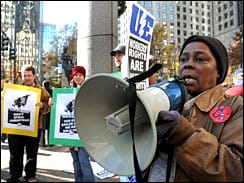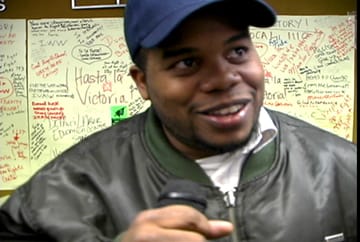Chicago – After six days occupying the plant, workers at Republic Window & 
The settlement totals $1.75 million. It will provide the workers with:
• Eight weeks of pay they are owed under the federal WARN Act,
• Two months of continued health coverage and
• Pay for all accrued and unused vacation.
JP Morgan Chase will provide $400,000 of the settlement, with the balance coming from Bank of America. Although the money will be provided as a loan to Republic Windows & Doors, it will go directly into a third-party fund whose sole purpose is to pay the workers what is owed them. In addition, the United Electrical Workers Union (UE) has started the “Window of Opportunity Fund,” dedicated to re-opening the plant.
Thousands of people around the country – and the world – sent messages to Bank of America and rallied at their local BofA branches in a show of solidarity that was crucial to winning this historic victory.
‘We did it!’
After the conclusion of negotiations Wednesday evening, the membership of UE Local 1110, more than 200 workers, met in the plant cafeteria to hear and consider the tentative settlement that had been worked out by UE negotiators over the past three days.
The settlement was approved by a unanimous vote. Following the vote, the UE members, led by Local President Armando Robles, marched out of the plant, chanting ‘We did it!’ in English and Spanish.
Robles stepped to the microphones outside the front entrance to the plant, where a throng of reporters and cameras had been waiting. “The occupation is over,” he announced. “We have achieved victory. We said we will not go until we got justice, and we have it.”

The Window of Opportunity Fund
Kingsley then announced the creation of a new foundation dedicated to reopening the plant. It will be initiated with seed money from the UE national union and the thousands of dollars of donations to UE Local 1110’s Solidarity Fund that have come in from across the country and around the world in just the past five days.
Melvin Maclin, vice president of Local 1110, announced the name of the foundation, which was chosen by the workers themselves: the Window of Opportunity Fund. Maclin said that the fund will be open to receive donations from all friends of the Republic workers and supporters of their struggle.
U.S. Rep. Luis Gutierrez was praised for his tireless work in behalf of the Republic workers and indispensable role in bringing about the settlement. He told reporters, “This money [the $1.75 million settlement] will only be used to pay the workers the benefits they are owed under the law, and it will not under any circumstance be used for corporate bonuses, luxury cars or any other perk for the owners of the plant.”
Workers flock to Republic in solidarity
Among the many Chicago workers who came to the Republic Windows plant to show their solidarity was Ayinde Murphy, a member of United Taxi Drivers Council, said that he was there because everybody is concerned about this issue, “because you, me, we could be next.”
Layoffs are a big problem in Chicago, Ayinde explained. “We are offended that the tax money of the U.S. citizens was just given to the banks to bail them out, to inject liquidity, so that they would give out loans, and now they won’t give it,” Murphy said. “[U.S. Treasury Secretary Henry] Paulson had the nerve to come up with a two-and-a-half page document, shorter than a student loan form, and demand $700 billion of taxpayer money to bail out the very banks that now won’t give out loans.”
Murphy said that he hoped the example of the Republic workers would be followed by autoworkers in Detroit. “All of my family lives in Detroit – autoworkers,” he said. “I know that they’re agreeing to make some concessions so that the auto companies, the Big Three, can stay in business and get a loan.
“I don’t have such a big problem with that, so much that the banks don’t have to go through this process. It’s impossible to ignore the fact that the reason that we have this housing crisis, this mortgage crisis, economic crisis is because the banks have been mismanaged for years. It’s hypocrisy at its highest.”

Kelvin was also there because he is the victim of a layoff. Until 2003, he was employed at Unilever. “They picked up and left us out to dry,” he said. Referring to the bailout, he said, “I want to know where all this money is going. Bailout? We need to be bailed out. We need to be bailed out right now. Come on, you work 15 years and you can’t get severance pay?”
Tony Caldera, a worker and member of the International Brotherhood of Electrical Workers, was there to support the Republic workers because he said he too had been the victim of a sudden layoff. He said a lot of people he knows are in the same position, and expressed anger over the bailout of the Wall Street banks. “It’s the low classes who pay the consequences,” he said. “It’s a situation where people lose. They take your money both ways.”
Union militancy resounds from seven decades ago
The Republic workers’ extraordinary initiative, courage and teamwork and their belief in their ability to beat the odds was forged in a three-year battle to topple a “company union” that had colluded with company owners and management. The union they chose to replace it is the United Electrical, Radio and Machine Workers of America, or UE, which calls itself “the USA’s rank-and-file union.”
Founded in 1936, UE became the first union chartered by the newly-established CIO. By the end of World War II, it was the third largest CIO union. But during the infamous McCarthy era of the early 1950s, UE came under ferocious attack as anti-Communist hysteria intensified. Shop leaders were fired, blacklisted even and jailed. With a surge of organizing in the 1990s, UE is again a force to contend with.
Republic Windows’ worker occupation is one of the first actions of its kind in the United States since the Great Depression, when a wave of sit-in strikes and factory occupations marked one of the most militant phases in U.S. labor history.
“In a sit-down,” explains a League for Industrial Democracy pamphlet written in 1937, “workingmen not only quit work but also refuse to leave the factory. Sustained by food from friends and relations outside the plant, sit-downers attempt to live and sleep at their work place … Sit-down strikes reached their peak between September 1936 and May 1937, when 485,000 workingmen were involved. …
“A new strike technique has swept the country, arousing enthusiasm among workers, and bewilderment among employers. In industry after industry, in state after state, the workers remain at their posts but refuse to work. No longer is it possible to introduce strikebreakers, for the workers are in possession. Nor are the workers readily dispersed, for they can barricade themselves in a strong defensive position. If strikebreakers or police storm the factory gate, they are clearly responsible in the eyes of the public for whatever violence may occur. The employer cannot too easily afford to alienate public opinion, or risk damage to his machinery. And so the workers remain in possession of the plant, in much more comfort and security than on the picket line.”
The pamphlet quotes a chant from the Depression that resounds in the historic victory of the Republic workers’ sit-down strike seven decades later:
“When they tie the can to a union man,
“Sit down! Sit down!
“When they give him the sack, they’ll take him back.
“Sit down! Sit down!
Chorus: “Sit down! Just take a seat.
“Sit down, and rest your feet,
“Sit down; you’ve got ‘em beat.”
This story was compiled by Bay View staff from reports by Chicago Jobs with Justice, UE, World Socialist Web Site and the LID pamphlet, forwarded by Roland Sheppard.





